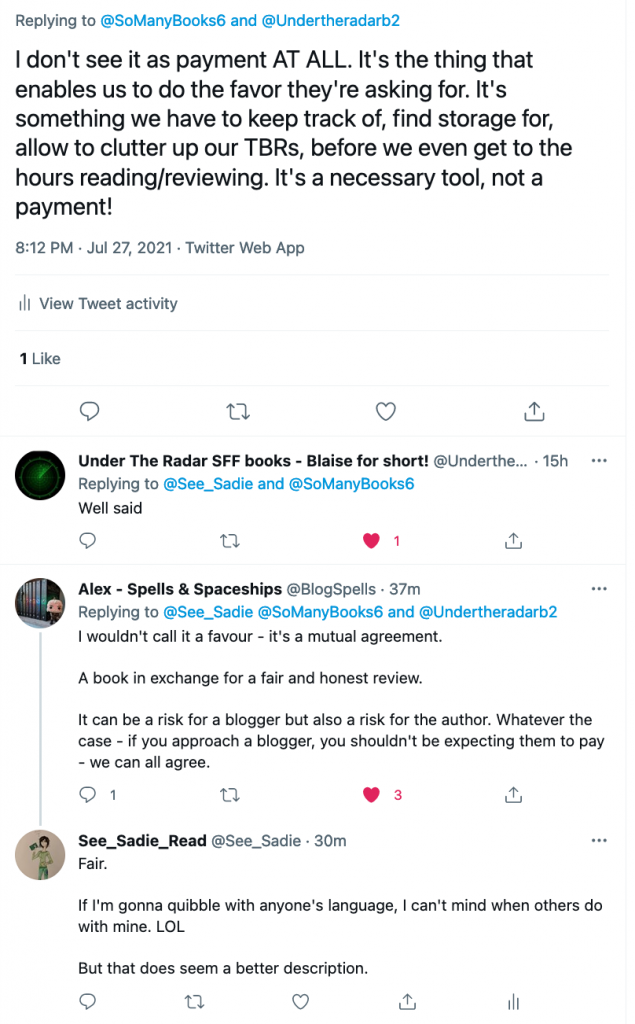I was part of a tweet exchange last night and this morning that got me thinking. Now, I hope this doesn’t feel like a subtweet (can you call it that if it’s a blog post), because I actually agree with everyone involved. But the whole thing got me thinking about why I took (and take) the position I did and why I used (and use) the language I did. It’s not always flattering (to myself or anyone else), but I’m going to be honest here; and I will go ahead and acknowledge several generalities in advance.
Here is the exchange, for the record:
As you can see, it’s not heated or controversial. I was quibbling about language and honestly, in retrospect, @SoManyBooks6 was probably right to call it semantics. But, for better or worse, I do have a position I was coming from in asserting that the difference between what they and I said in our initial exchanges differ. Perhaps only enough to make it feel like it surpasses semantics, but definitely enough that I built myself a hill to die on. And this post is going to be heavily based on feelings.
Again, to be absolutely clear, I agree with the other bloggers on the larger point and @SoManyBooks6 (from So Many Books), @Undertheradarb2 (from Under The Radar SFF Books), and @BlogSpells (from Spells and Spaceships) seem like my kind of people. So, I hope no one takes this as any sort of attack on them. It 100% isn’t meant to be. It’s just that our exchange got me examining some of my own internal biases and beliefs.
Undoubtedly, @BlogSpell’s language in the second exchange, where they took issue with my word choice in the same way I previously had @SoManyBooks6’s, is better—more polite, more accurate, and even more common. What I want to address in this post is why I didn’t use it to begin with.
The short answer is that I didn’t think of it. But that’s a surface-level answer. I mean, if it’s the most common, almost industry-standard verbiage, why wasn’t it what came to mind? I’m fairly sure I could have fit it in the 280 characters, even if it would have been close.
 The deeper answer is that after almost 8 years running this book review blog and being inundated with book review requests, the the whole scenario too often doesn’t actually feel like an equal exchange anymore.
The deeper answer is that after almost 8 years running this book review blog and being inundated with book review requests, the the whole scenario too often doesn’t actually feel like an equal exchange anymore.
Of course, this too requires a deeper critical look. And I don’t always come out smelling like roses. Part of the issue—the simplest—is that an exchange of this sort is between two people. An author* contacts me and requests that I read their book, I say yes, they send me the book, and I read it and post a review. This is the exchange and mutual agreement, a book for a review.
I know that at it’s heart, no matter what, each author and their request is an individual. But the truth is that this gets lost a lot of the time for me. What more often has happened** is that I open my email to 25 request, most of them not following my policies and procedures. Which means:
a) they’re asking me to review their book but weren’t willing to take the time to read my preferences, or
b) they read them and didn’t respect them enough to abide by them.
 This is annoying by itself. But it also means that by the time I’ve come to the one author who has asked me to read a book within my stated perimeters and I respond in the affirmative to their request, I’ve had to send out several ‘this doesn’t fit my stated policies and procedures’ emails first. Which opens the whole affair to feeling like it’s between me and an advancing horde, instead of me and an individual author.
This is annoying by itself. But it also means that by the time I’ve come to the one author who has asked me to read a book within my stated perimeters and I respond in the affirmative to their request, I’ve had to send out several ‘this doesn’t fit my stated policies and procedures’ emails first. Which opens the whole affair to feeling like it’s between me and an advancing horde, instead of me and an individual author.
Notice the feel in there again. This is about how it feels, not how it literally is. And when you feel that the majority of people requesting you read and review their book have either done so without taking even a few moments to get to know you and what you read, or have read your policies and procedures and decided to ignore them, the respectful exchange aspect gets occulded.
It starts to feel like you’re considered an openly available resource, not a person. And, in my case, that shifted me away from feeling respected and that there was anything mutual in the exchange. I suppose I could have gone any number of ways at that point. If it wasn’t a mutual exchange, what was it? Apparently, I settled on doing authors a favor. And I think I did this as a way of subconsciously protecting myself. I’d rather be doing a favor for an author than being taken advantage of by them.
Is it an accurate description of what is happening? Maybe if you squint at it in the right light. And I’ve apparently felt this way for a while.
The ‘ How to Piss off a Book Blogger: Treat Them Like an Employee‘ post, referred to in one of the tweets, is from 2013 and in it I say:
I blog about books. I do this for the sheer joy of it and part of that joy comes from doing other authors a good turn. Because make no mistake, if I review your book on request I am doing you a favour. I am passing up the opportunity to read any number other books. Books I’ve chosen because they appeal to me. Books I may, perhaps even will probably, like more than yours for just that reason. Books that sit unread because I am kind enough to take requests, your requests.
Without even thinking about it, a favor is how I characterized the author-blogger exchange in the tweet last night. And I think that says a lot about how book bloggers start to feel devalued over time. (Of course, I can only speak for myself, but I do believe that the number of bloggers who have closed their blogs or simply stopped taking requests speaks to me not being the only one to feel at least some of this.)
I also think it’s important to take a moment here to acknowledge that I’m absolutely not talking about every author and every exchange I’ve had on this blog. I have met some marvelous people and have read some wonderful books. I wouldn’t keep blogging if the good didn’t outweigh the bad. Plus, I’ll obviously never know how many authors DID read the P&P, realized that I didn’t read their book’s genre (or whatever aspect disqualified them), and rightly chose not to request a review from me. I appreciate every one of them. I love reading, books, and authors. So, it seems counterintuitive to appreciate an author NOT contacting me. But I don’t enjoy every genre and I appreciate those who respect that and my time.
Unfortunately, those that annoy you, or the sheer volume of those that do, is what tends to stick in one’s mind over the long run, especially if it’s a repeated issue. I know if I go back and read some of the posts similar to this one, that I’ve written in the past; the ones where I complain about this or that aspect of accepting book review requests (and there are an embarrassingly large number of them), I’d probably realize the issues are comparatively minor. But even small things start to chafe after repeated exposure. We’re left with a book review blogger who forgets not to center herself, who forgets that the exchange between herself and an author is supposed to be singular, and a mutually beneficial one.
 To bring this all back around to the original tweet, this is also why I have such a hard time with the rather innocuous phrasing “ebook as payment.” I am neither an employee nor a contractor, both of whom receive a “payment” and are therefore subordinate to whomever is paying them, for the period of the exchange. It comes down to the power differential. If you’ve been paid for a service by someone, you are subject to their whims. While this might be a mutual exchange—a good for a service—it is not an equal one. “The client is always right.” “I hired you, so…” It gives the payer the right to make demands of the payee, and the payee is expected to acquiese. Nothing in the book-in-exchange-for-a-review should leave room for demands. And as a blogger who already feels undervalued, that takes on a whole new and problematic aspect.
To bring this all back around to the original tweet, this is also why I have such a hard time with the rather innocuous phrasing “ebook as payment.” I am neither an employee nor a contractor, both of whom receive a “payment” and are therefore subordinate to whomever is paying them, for the period of the exchange. It comes down to the power differential. If you’ve been paid for a service by someone, you are subject to their whims. While this might be a mutual exchange—a good for a service—it is not an equal one. “The client is always right.” “I hired you, so…” It gives the payer the right to make demands of the payee, and the payee is expected to acquiese. Nothing in the book-in-exchange-for-a-review should leave room for demands. And as a blogger who already feels undervalued, that takes on a whole new and problematic aspect.
It starts to feel like all those authors, who already didn’t respect me enough to acknowledge that I’m not open to receiving requests from every author who feels entitled to email me, only need send a book—a payment—to excuse their own boorish behavior. And more importantly, as per good customer service, the reviewer should smile and accept it. We’ve been paid, after all.
As I said above, I feel like this is more than semantics, though I acknowledge that it likely isn’t. Was it a debate worth having on twitter with a virtual stranger? Of course not. But I always find it worth a deep dive into my own thought processes. It’s too easy to let things settle into unacknowledged biases and then have them creep up at inopportune times.
If you want a TL;DR version, the main points I’d like people to take away from this (beyond my ramblings about myself) are:
- A book in exchange for a review is not a payment. It is simply what enable the blogger to read and review your book. @SoManyBooks6’s initial point about not expecting bloggers to buy your book is spot on. I consider a review request that expects me to purchase the book an advertisement, not a valid review request.
- Bloggers do not appreciate when their stated preferences are ignored. The response will never (at least in my case) be, “Oh, I said I didn’t like this kind of book, but I’m so glad they messaged me. I’ll make an exception.” Never. It will be annoyance.
- Authors’ attitudes toward bloggers’ (and this includes if you do or don’t respect our stated reading preferences) absolutely effect our willingness to continue accepting book review requests. I’ve found that over time I judge authors en masse, which means your bad behavior negatively effects everyone.
- We KNOW when you have made no effort and over time that drives us way from blogging. Again, you’re ruining it for everyone.
- Because of the above 4 points, I’ve apparently become overly sensitive to some otherwise innocent phraseology and due to a simple tweet thread I had reason to stop, examine and acknowledge this.
I realize that I’ve written on this sort of thing before and it makes me sound bitter and hateful. Especially since, as I noted in the footnote below, I’m not currently getting the flood of review requests I once did. But I do honestly process thing better when I write them out. So, some of it absolutely is for my own benefit. The tweet thread really did make me stop and go, “Why did I phrase it that way, exactly?” It’s not that I was unaware, I wrote a ranty blog post about it in 2013, after all. But it’s amazing how long you can go without thinking about something and that’s how sneaking biases can slip in.
But I also think every blog post out in the wild that a review-requesting author might stumble across that reminds them not to treat their bloggers as disposable, blank -late commodities is important. We have reading preferences, feelings, and preferred processes that should be taken into account. We don’t work for you. Hopefully, we work with you.
*I’m going to use author, but acknowledge it could be an author, a publisher, a PR manager, a personal assistant, etc.
**I use the past tense here because I currently have what I’ll accept for review locked pretty tightly and I’m not currently getting a lot of requests. But this hasn’t always been the case. (I actually have some really unflattering and probably controversial thoughts on why this reduction in requests has been successful this time, where it hasn’t in the past. But I’m not going to address them here.)






